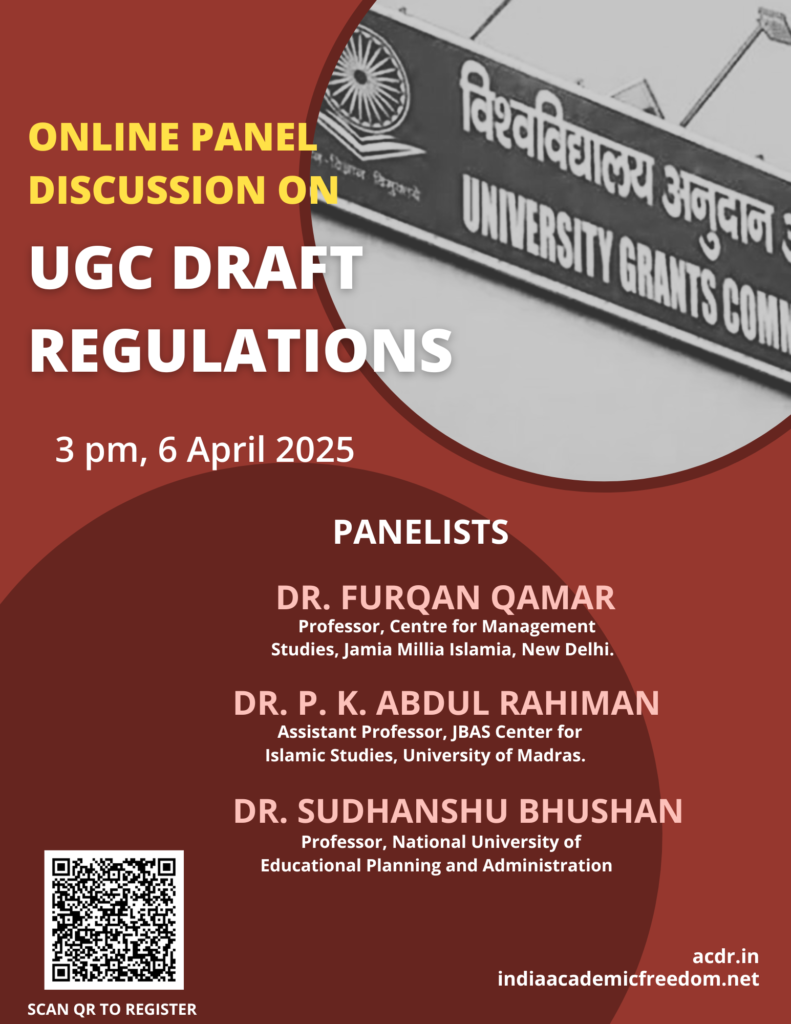Panel Discussion on UGC Draft Regulations

At 3 pm on 6/4/2025, ACDR and India Academic Freedom Network will be hosting an event on the new UGC draft regulations.
Those interested can register by filling in this form.

At 3 pm on 6/4/2025, ACDR and India Academic Freedom Network will be hosting an event on the new UGC draft regulations.
Those interested can register by filling in this form.
On Thursday, 28 Nov, 7 pm IST, we are hosting a talk by members of the
right to education campaign from Birzeit University in Palestine.
They will testify to the genocide and scholasticide that Israel is
conducting in Palestine.
It is a rare opportunity for many of us to interact directly with
members of the Palestinian community. Please register for the event at:
https://docs.google.com/forms/d/10wQzS3hR_OicKklSNvt2X3kiWdNKqOapk3CVGNNMDqU/edit
We will email a Zoom link to registrants shortly before the meeting.
ACDR has learned of a worrying circular that has been sent to the heads of all centrally funded higher educational institutions by the ministry of education. The ministry asks these institutions to review employees
periodically and determine their suitability for continued service by checking:
1. doubtful integrity
2. ineffectiveness
3. conduct unbecoming of a government servant.
On Tuesday, 15 October, 7 pm Academics for Democratic Rights has organized a virtual discussion led by Dr. S. S. Chakrabarti who is an author of a study on Covid-19 vaccines that has attracted significant recent attention.
More than 1500 students and faculty members from universities across the country and other members of civil society have written a letter to the IISc Director expressing their concern on an Indo-Israel summit that was held in IISc.
We will be hosting a zoom panel discussion on Academic Freedom, CCS Rules and Democratic Rights in Academic Institutes on 9th December 2023 at 11… Read More »Panel Discussion on Academic Freedom, CCS Rules and Democratic Rights in Academic Institutes
Reposted from IIT Kanpur Citizens’ Forum.
A cryptic communique from the Institute authorities on 23rd October 2023 informed the community that a construction worker named Mr. Shankar had died the day before. It had no other details about the cause of death or the deceased. And there is a serious reason to believe that the communique did not even get the day of the accident correct. We at Hamara Manch tried to collect some basic details about the accident, work conditions at the Hall 14 construction site, and the protocols followed in case a mishap occurs. But the complete lack of transparency as to who is the accountable authority and the extreme secrecy, which everyone is expected to maintain, makes it very difficult to get even the basic facts. We share here the facts which we were able to crosscheck from multiple sources. But this report is not merely to share the untimely and tragic loss of the life of a young person, as it is not an isolated incident. This is the third fatality of a worker in IIT Kanpur in the last 22 months that we at Hamara Manch are aware of. And there seems to be a pattern of serious lapses which should be of grave concern to all of us. Incidentally, the earlier deaths did not even merit a communique from the Institute, and the only documentation is that which was done by Hamara Manch.
Read More »Another Workplace Death at IIT Kanpur: Systemic Lack of Safety and Medical ProtocolsRabindranath Tagore founded Visva-Bharati as an institution of learning in 1921 in a district named Birbhum in the southern part of the present day West Bengal, arguably using a part of his Nobel Prize award money. He gave the name Visva-Bharati very consciously which meant a communion of the world with India and he wanted to create an education system opposing the colonial education system. Tagore wanted his students’ view of society to be informed by internationalism, humanism and universal brotherhood. He viewed the traditional school, bounded by its four walls and weighed down by a rigid curriculum, as a prison. At Bolpur-Shantiniketan Visva-Bharati campus, classes are held in open air. The idea is to be close to nature, where students could define their boundaries of knowledge.
After independence, in 1951 i.e. exactly a decade after Tagore’s demise it was converted into a central University with the Prime Minister as its Chancellor. The university is divided into institutes, centres, departments and schools, spread over a large part of the University city of Bolpur in Birbhum district.
Read More »Attack on Democratic rights at Visva-Bharati University30 June 2023 Prof. Govindan Rangarajan, Director, Indian Institute of Science, Bengaluru Dear Prof. Rangarajan, We are a group of scientists and academics. Our group… Read More »Letter to IISc Director
Natasha and Devangana will take us through their journey of being
charged under the Unlawful Activities Prevention Act (UAPA) elaborating
on how this draconian law which stands in violation of many fundamental
constitutional values, has become an instrument for suppressing dissent
by those in power. They will look at the history of the use of such
‘exceptional laws’ and how they contribute to enhancing the power of
authoritarian regimes. Drawing on their experiences of incarceration,
they will also share their reflections on the urgent need for thinking
politically about prisons — how our criminal justice system
disproportionately incarcerates the most marginalised communities in our
country, making access to justice contingent on one’s caste-class-gender
locations.